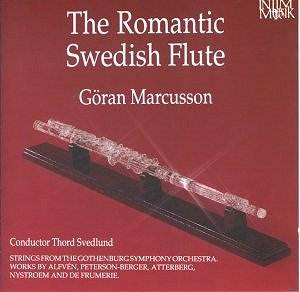Sentimentality, grace, rustic charm and flightiness
flicker and dance through the flowingly performed music on this
disc. This is romantic music indeed but the composers and arranger
as well as the performers avoid suffocating these fragile blooms
with honey and the necessary elusive restraint is shown in the
Nystroem.
The Alfvén and Peterson-Berger tracks
are all as arranged by Jerker Johansson. The other works are as
written by the respective composers. Interestingly the two substantial
works, those by de Frumerie and Nystroem, have their origins in
Paris. Both composers were studying there in the 1920s and frequented
the artists’ café known as ‘Dôme’. There they met
Karol Szymanowski and the French flautist and conductor Philipe
Gaubert. There was some talk of Szymanowski, Nystroem and de Frumerie
writing a composite flute concerto - rather like the Mont Juic
dances of Britten and Berkeley. The co-operative work did not
come to fruition but both the Swedish composers produced their
own work for flute and orchestra; in the case of de Frumerie there
is also a 1969 flute concerto.
Nystroem’s work is chaste … melodic, yes
but with a chilling softening of focus over the proceedings. The
work starts in an unorthodox way with an adventurous lengthy Lento
chastely lulling into a bright allegro. This prepares the way
for an Adagio in which a song by Szymanowski is quoted.
This is followed by a gently rocking Canto Semplice very
French at first but in which we can hear the shreds of similar
moments in the Sinfonia del Mare. Speaking of that work
the Symphony’s determined scherzo with its grim Bernard Herrmann
mordant rhythms is echoed in the Molto ritmico. Those rhythms
will make you think instantly of the crop-duster episode in North-By-North-West.
The work was written in 1937 the year of Szymanowski’s death and
is dedicated to the memory of that composer.
If the Nystroem has an Arctic cool the de
Frumerie is warmer, pastoral (no surprises there), sentimental,
cheery and appealing. It is a personable work of no great profundity
but catching perfectly the fragile and evanescent moods of any
peaceful pastoral scene. It is likely to be instantly appealing
to anyone who loves the lighter music of composers such as Julius
Harrison, Ronald Hanmer, Richard Rodney Bennett and Fauré.
The de Frumerie, like the Nystroem is in five movements and the
Sarabande would be an excellent track to sample. He is
at his very considerable best in the slower movements.
Of the other tracks the Atterberg is his
very last piece. It is dedicated to that champion of the baroque,
the German conductor, Karl Ristenpart. The music is sweet and
very slow moving. This is not something you can say about the
firefly brilliance of Alfvén’s Vallflickans Dans
extracted from Bergakungen (1923) although there is
a central sargasso. Peterson-Berger’s Frösöblomster
(a long cycle of piano solos - a bouquet of flowers) were designed
to be appreciated by everyone; not just the artistic ethereals.
They have been recorded many times and the Bis recording of the
complete cycle is well worth tracking down. Numerous arrangements
have been made so purists will have no cause to look askance at
Mr Johannsson’s work on the first six in the sequence. These pieces
are the perfect accompaniment to a summer walk among woodland
and along the shore. Tennis by the way was the composer’s favourite
sport. He had a tennis court constructed near his custom built
house on the island of Frösön far from the pressures
of Stockholm. The fact that he was a most uncompromising music
critic who never took prisoners need not detain us from absorbing
the Nordic radiance of these simple pieces.
Rob Barnett
